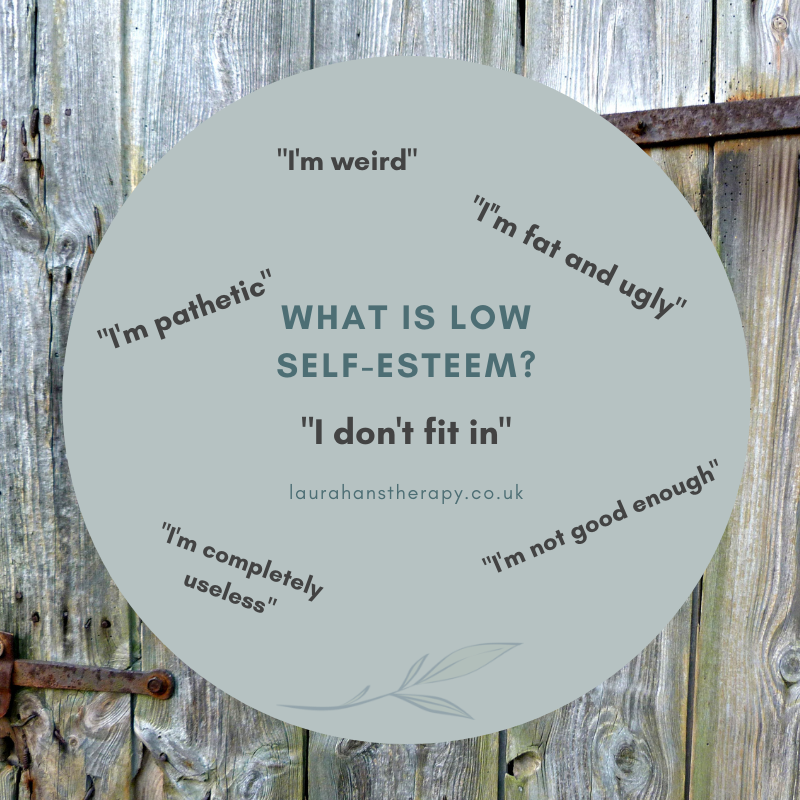What Is Low-Self Esteem?
Low self-esteem is something that I see very commonly in clinical practice. Your self-esteem relates to how you view yourself and what values and qualities you feel you have. When someone has low self-esteem, it really means that their opinion of themselves is not great, they may think about themselves in a very critical way and not feel as though they have many positive qualities. People with a low opinion of themselves can feel as though they do not have anything to be proud of and tend to feel quite dissatisfied with themselves and their achievements.
Low self-esteem tends to originate in your early life experiences and there are said to be some factors that may play a role in whether you will go on to develop it. These can include things such as experiencing excessive punishment, neglect and abuse in childhood, and not meeting the standards of others (such as parents/caregivers or teachers). It can also include feeling as though you do not fit in, being bullied at school/home (or both), being in an environment where there is excessive stress a lot of the time, and when the people around you tend to focus on the negatives about you more often than they notice your positive attributes.
How Does Low-Self Esteem Shape Our Beliefs & Behaviours?
We know that past experiences shape your beliefs about yourself, others around you, your world, and your future. So, it makes sense that if you have experienced any (or all), of the above factors a lot of the time, that this may directly or indirectly lead you to develop negative, critical, and unkind beliefs about yourself. If you believe that you are essentially useless and that you do not fit in with others, you are likely to act as if this is true in your day to day life. This might lead to you not trying new things because of the risk of getting it wrong and being “proven” that you are useless. Or it could go the other way and mean that you strive for perfection and ensure that you always push yourself to do better, because doing this will protect you from how useless you really feel.
These behaviours that are linked to your negative core beliefs make absolute sense, however, not doing new things, or overachieving to the nth degree can start to impact your life, your job, and your relationships with others.
How Can Psychotherapy Help With Low-self Esteem?
The good news is, low self-esteem is treatable, and therapies such as CBT can help you unlearn some of the unhelpful ways of thinking about yourself that you have picked up along the way, whilst also helping you to test some of your unhelpful thoughts or behaviours to see whether they are helping you build a healthy self-esteem, or whether they are actually keeping you stuck in a cycle of low self-esteem. Treatment can also help you tune into the qualities that you do have and place more of your attention on that as opposed to the negatives, which is likely to reinforce your low opinion of yourself.
Another way that CBT can work with low self-esteem is by helping you to identify anxious and self-critical thoughts that feed into emotional distress, and to learn how to question and challenge them, rather than just believing them as they pop into your mind. Doing this can help you step out of your negative thoughts, and look at yourself, your situation and your life more objectively, which in itself can improve how you feel.
Therapies such as Eye Movement Desensitisation & Reprocessing (EMDR Therapy) helps to reprocess any past experiences that may have played a role in the development of low self-esteem. For example, being bullied, or having someone close to you being critical of you. You can read more about EMDR Therapy here.
Try this top tip!
Start to write down three things each day that you are proud of, or that went well, that you enjoyed doing, that showed something good about you, or that someone else commented on about you, which made you feel good. Really focus on these three things and what they mean about you. Allow yourself to start believing these things instead of the critical things that you may typically focus on.
How does this change how you feel about yourself? It may take time doing this, and it might feel strange initially, especially if you really are chronically hard on yourself. With time and frequent practice, you will notice a difference in your self-esteem as you think about yourself more compassionately.
I have developed a free guide on helping you learn to love yourself which would be a great guide to work through with even more tips. All you have to do subscribe and the guide is sent directly to your inbox. Click here to get yours now.
Low self-esteem is something I particularly enjoy working with and I thrive on seeing the changes people can make in their lives by trying to improve their sense of self-worth. It often takes some time & effort, but improving your self-esteem is entirely possible with the right help and support.
Useful Links:
Subscribe To Your Free Learning To Love Yourself Guide
Hold The Mother Podcast Episode 7: Improving Self-Esteem In Motherhood
